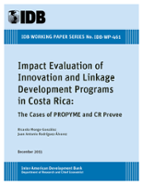Impact Evaluation of Innovation and Linkage Development Programs in Costa Rica: The Cases of PROPYME and CR Provee
Date
Dec 2013
This paper estimates the impact of two productive development programs (PDPs) in Costa Rica: PROPYME and CR Provee. The first seeks to increase the capacity of small and medium-sized firms (SMEs) to innovate, and the second aims to increase backward linkages between Costa Rican SMEs and multinational companies operating in the country. The impacts of each program were measured in terms of three result variables: real average wages, employment demand, and the probability of exporting. A combination of fixed effects and propensity score matching techniques was used in estimations to correct for any selection bias. The results show that both PROPYME and CR Provee have positive and significant impacts on SME performance. PROPYME¿s beneficiaries performed better than other firms in terms of labor demand and their probability of exporting, while firms treated by CR Provee showed higher average wages, labor demand, and chances of exporting than untreated firms. Firms treated simultaneously by both programs performed better in terms of average wages than those that were only treated by CR Provee. This result is of special interest to policymakers since it indicates the importance of bundling in the implementation of PDPs. The findings suggest that policies aimed at overcoming the weaknesses of these two programs are important for obtaining higher real wages, generating more employment, and increasing the probability of exporting by Costa Rican SMEs.




